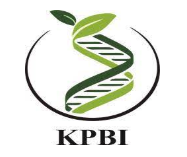KARAKTERISTIK TUTORIAL ONLINE PERKEMBANGAN TUMBUHAN BERBASIS MASALAH DENGAN SIKLUS REFLEKTIF GIBBS DAN EPORTFOLIO PADA MATA KULIAH PERKEMBANGAN TUMBUHAN
DOI:
https://doi.org/10.15575/bioeduin.v9i1.4338Keywords:
Online Tutorial, Plant Development, Problem-Based Learning, Gibbs’ Reflective Cycle, E-PortfolioAbstract
Development online tutorial program based on problems with Gibbs reflective cycles and eportfolio
that aim to develop reflective thinking skills of biology education students who
follow online tutorials Plant development has been developed through several stages. To find
out how the characteristics of the program, a study was conducted on the results of the
program trials. In this program, students' reflective thinking skills are honed through
reflection activities using the Gibbs reflective cycle which is preceded by problem-based
learning activities. Students can do activities and tasks given by the program freely, but still
in the control carried out by the system in the form of navigation. The program has flexibility
in the pace of student learning, but it still pays attention to the integrity of online tutorial
activities and tasks done by students. From the From the study, it was found that the program
has three main characteristics, namely 1) honing students' reflective thinking skills, 2)
controlling, and 3) having a flexible system based on student learning pace.
References
Allen, E.I & Seaman, J. (2011). Going the Distance : Online Education in the United States, 2011, Babson Survey Research Group and Quahog Research Group, LLC.
Anderson, T. (2008).
Ally, M. (2004). Theory and Practice of Online Learning. Dalam T. Anderson & F. Elloumi (Penyunting), Foundations of Educational Theory for Online Learning (hlm. 3-31). Canada: Athabasca University.
Choy, S.C. & Oo, P.S. (2012). Reflective Thinking And Teaching Practices: A Precursor For Incorporating Critical Thinking Into The Classroom?, International Journal of Instruction. Vol. 5. No.1. hlm. 167 – 182.
Guthrie, L.K. & Mc Cracken. (2014). Reflection: The Importance Of Making Meaning In E-Service-Learning Courses. Journal Computer High Educ. 26,hlm. 238 – 252
Gibbs, G. (1988). Learning by Doing, A Guide to Teaching and Learning Methods. Online Ed. 2013
Klopper, H. (2017). Flexible Online Learning is Better Learning. Retrieve from https://iversity.org/blog/flexible-online-learning/
Kuo, et al. (2014). Interaction, Internet self-efficacy, and self-regulated learning as predictors of student satisfaction in online education courses. The Internet and Higher Education, 20, hlm. 35-50.
Lia, P. (2016). Using Gibbs’ Reflective Cycle. Learning Support Tutor. Universiti Pendidikan Sultan Idris
Lim, LY. (2011). A Comparison Of Students’ Reflective Thinking Across Different Years In A Problem-Based Learning Environment. Instructional Science, 39, hlm. 171 – 188.
Pappas C, 2016, Top 8 eLearning Activities Online Learners Love. Retrieve from https://elearningindustry.com/top-8-elearning-activities-online-learners-love
Pappas C, 2017, 8 Ways To Encourage Online Learner Reflection In eLearning, E-Learning Industry. Retrieved from https://elearningindustry.com/ways-encourage-online-learner-reflection-elearning
Peck, M.L. 2017, How Flexible E-Learning Works in an On-Demand World. Retrieve from https://trainingindustry .com/articles/e-learning/how-flexible-e-learning-works-in-an-on-demand-world/
Pianpeng, T., Koraneekij P,. (2016). Development of a Model of Reflection Using Video Based on Gibbs’s Cycle in Electronic Portfolio to Enhance Level of Reflective Thinking of Teacher Students.In International Journal of Social Science and Humanity, Vol. 6, No. 1, January 2016
Reese, A.S. (2014). Online Learning Environments in Higher Education: Connectivism Vs. Dissociation. Education Information Technology. New York: Springer.
Salmon, G. et al. (2015). The Space for Social Media in Structured Online Learning. Research in Learning Technology, Vol 23.
Setia, A.& Ankara, A. (2013). Model Pembelajaran Penemuan (Discovery Learning) Dalam Implementasi Kurikulum 2013. Retrieve from https://www.academia.edu/30808102/MODEL_PEMBELAJARAN_PENEMUAN_DISCOVERY_LEARNING_DALAM_IMPLEMENTASI_KURIKULUM_2013_MODEL_PEMBELAJARAN_PENEMUAN_DISCOVERY_LEARNING
Sun, et al. (2007). What drives a successful e-Learning? An empirical investigation of the critical factors influencing learner satisfaction. Computers & Education, 50, hlm 1183-1202.
Teräs, H & Herrington, J. (2014). Neither the Frying Pan nor the Fire: In Search of a Balanced Authentic e-Learning Design through an Educational Design Research Process. IRRODL,Vol 15 No.2.
Tuncer, M. & Ozeren, E. (2012). Prospective Teachers’ Evaluations In Terms Of Using Reflective Thinking Skills To Solve Problems. Procedia - Social and Behavioral Sciences, 51, hlm. 666 – 671.
Turkey, A.M. (2015). Promoting Reflective Thinking Skills by using Web 2.0 Application. Retieve from https://files. eric.ed.gov/fulltext/ED562662.pdf
Downloads
Published
How to Cite
Issue
Section
Citation Check
License
Authors who publish in Jurnal BIOEDUIN agree to the following terms:
- Authors retain copyright and grant the journal right of first publication with the work simultaneously licensed under a Attribution-ShareAlike 4.0 International (CC BY-SA 4.0) License that allows others to share the work with an acknowledgment of the work's authorship and initial publication in this journal.
- Authors are able to enter into separate, additional contractual arrangements for the non-exclusive distribution of the journal's published version of the work (e.g., post it to an institutional repository or publish it in a book), with an acknowledgment of its initial publication in this journal.
- Authors are permitted and encouraged to post their work online (e.g., in institutional repositories or on their website) prior to and during the submission process, as it can lead to productive exchanges, as well as earlier and greater citation of published work (See The Effect of Open Access).








